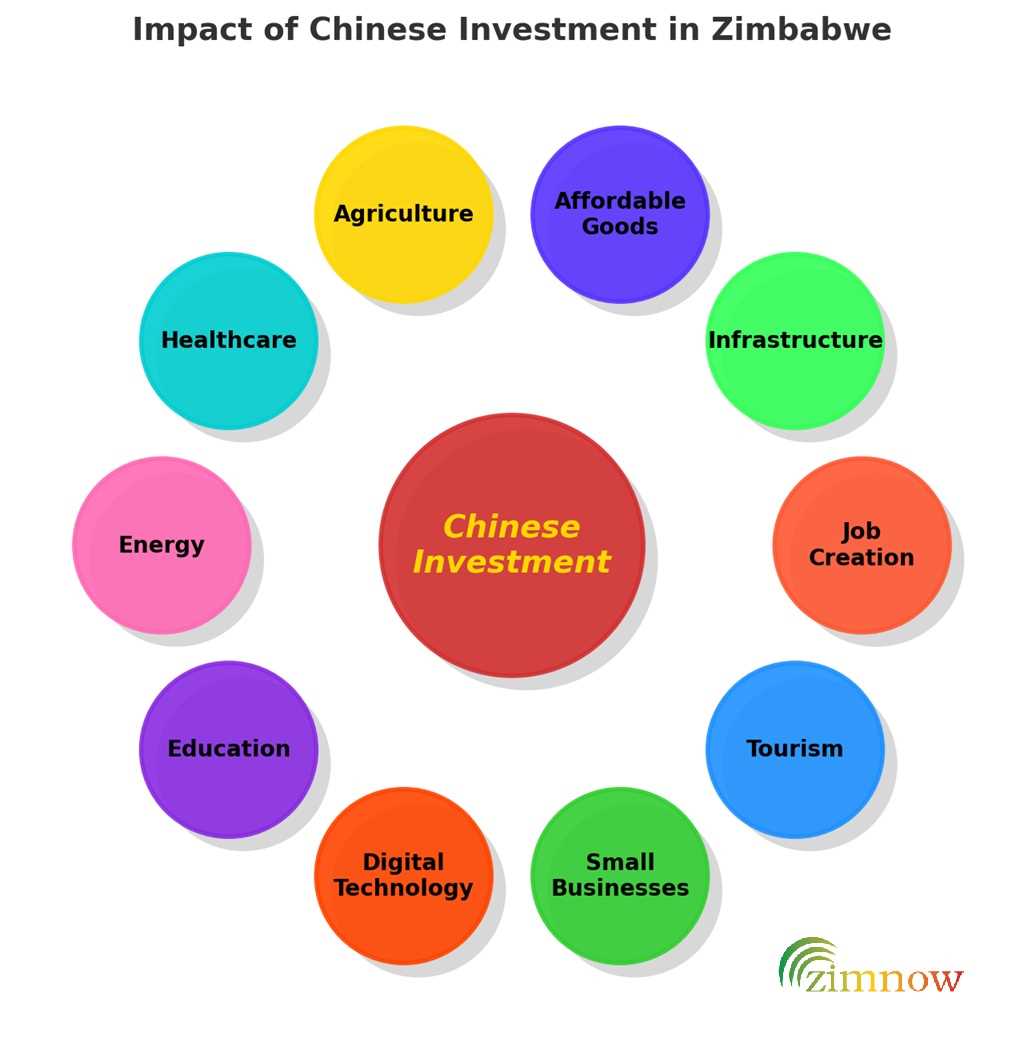
Monica Cheru
Over the past two decades, Chinese investment in Zimbabwe has reshaped key sectors of the economy, bringing tangible benefits to ordinary citizens. From infrastructure development and job creation to improved access to technology and healthcare, the impact is far-reaching. While much attention is often given to large-scale projects and high-level agreements, the true measure of success lies in how these investments have improved the daily lives of Zimbabweans.
This article explores ten ways in which Chinese investments have directly benefited ordinary Zimbabweans. Using specific examples and statistics, we highlight how this economic partnership has created jobs, enhanced local businesses, and made essential goods and services more accessible. These are not abstract developments but real-life improvements that can be seen in homes, workplaces, and communities across the country.
1. Job Creation Across Multiple Sectors
Chinese investments have significantly contributed to employment opportunities in Zimbabwe, particularly in mining, construction, and manufacturing.
Manhize Steel had1400 workers as of May 2023 and the figure is expected to rise to 5000 as production goes full scale. More employment has been created up and downstream.
Sino-Zimbabwe Cement Company has also created thousands of jobs, both within the organisation itself and in related services.
The expansion of lithium mining at Arcadia Mine and Bikita Minerals has provided employment for both skilled and unskilled workers.
Kamativi Mining Company has created work for its own direct employees and others who have moved in to service the boom as the ghost town has received a new lease of life.
Additionally, Chinese-funded projects such as the Kariba South Hydropower Extension saw the employment of over 700 Zimbabwean workers during construction.
The availability of jobs has improved livelihoods, allowing more families to afford education and healthcare.
It should also be noted that many Chinese companies have actively recruited women employees including unskilled workers. These women have moved from being unpaid domestic labourers to breadwinners.
2. Infrastructure Development
China has played a major role in Zimbabwe’s infrastructure boom, with projects like the Hwange Power Station Expansion and the airports upgrades.
These developments have enhanced connectivity and improved business operations.
The number of airlines have increased which directly creates more jobs and makes life easier for Zimbabweans to travel around the world as well as making Zimbabwe more connected to the rest of the world.
3. Affordable Consumer Goods and Market Growth
Through mass imports and local production, China has made goods more affordable for ordinary Zimbabweans. Chinese retailers and suppliers have reduced the cost of electronics, clothing, and household essentials, making them more accessible.
For instance, Chinese-manufactured solar panels and inverters have led to cheaper off-grid electricity solutions, giving access to lighting and phone charging for millions of Zimbabweans in rural areas who would otherwise be unable to use mobile phones at will.
More affordable solar options are also allowing urban Zimbabweans to stay connected and have access to energy at a time when the national grid is failing to meet demand.
A few years ago, plastic was highly expensive with many people only able to afford discarded containers imported from South Africa commonly called “achas” from that Atchaar preserve that they contained originally.
But now local Chinese manufacturing means that a bucket that previously cost about $5 is now less than a dollar, creating a whole new economic value chain as locals benefit from the distribution network.
Hundreds of Zimbabweans are now making a living reselling plastic ware across the country.
4. Agricultural Support and Food Security
Related Stories
Chinese investment in agriculture has boosted local food production. For example Tian Ze Tobacco Company has helped Zimbabwean farmers modernize tobacco farming, ensuring higher yields and improved earnings.
Zimbabwe’s tobacco sector, which contributes over $1 billion in annual exports, owes much of its growth to Chinese buyers who now account for more than 60% of Zimbabwe’s tobacco exports.
Additionally, Chinese machinery has improved irrigation schemes, allowing small-scale farmers to expand operations. All this has direct impact on ordinary Zimbabwean families in the chain, including farmers, transporters, those in the marketing field and the hundreds of employees in the industry.
5. Access to Healthcare and Medical Supplies
China has significantly contributed to Zimbabwe’s health sector by constructing health service facilities, donating medical supplies, and facilitating knowledge transfer.
Health facilities like Mahusekwa Hospital in Mashonaland East, built through Chinese aid, and other facilities built by private enterprises like Mukubu Clinic financed by Sabi Star Lithium Mine in Buhera have improved healthcare access for thousands of rural residents.
Specialists with resident Chinese medical teams in the country pass on skills to local health practitioners and give specialised access to thousands of Zimbabweans. The 21st China Medical Team currently stationed at Parirenyatwa has attended over 60 000 patients through outreaches in areas as far afield as Hwange and Bikita.
Additionally, the Chinese Sinopharm and Sinovac vaccines played a crucial role in Zimbabwe’s COVID-19 vaccination drive, ensuring a rapid response to the pandemic.
6. Energy Security and Power Generation
Zimbabwe’s power generation capacity has been enhanced through Chinese-funded projects such as the Hwange Thermal Power Station’s Units 7 & 8 Expansion, which added 600 MW to the national grid. This has led to reduced load shedding, benefiting both businesses and households.
The Kariba South Extension project, completed with Chinese funding, has also contributed, stabilizing electricity supply although output is affected by dam levels. This increased energy security supports local industries, reducing operational costs for factories and farms.
7. Skills Development and Education
China has invested heavily in education and skills development, offering scholarships and training programs for Zimbabwean students. Hundreds of Zimbabweans have been trained in China through full scholarships in fields like engineering, medicine, and agriculture.
China constructed 17 schools in Zimbabwe including the beautiful Zimbabwe-China Friendship High School in Hatcliffe.
Private enterprises like Prospect Lithium and Kamativi Mining Company have also stepped in to develop education infrastructure and fund various initiatives in their communities.
Locally, institutions such as the Confucius Institute at the University of Zimbabwe have equipped students with language and business skills, enhancing their ability to engage in global trade and diplomatic relations.
8. Digital Technology and Telecommunications
Chinese companies like Huawei and ZTE have transformed Zimbabwe’s telecommunications landscape, providing affordable smartphones, expanding network coverage, and improving internet access.
The widespread availability of affordable Tecno and Itel smartphones—brands backed by Chinese investment—has increased mobile penetration in rural areas, boosting financial inclusion through mobile banking.
The National Data Centre Project, developed by China, has enhanced the government’s digital infrastructure, improving service delivery.
9. Investment in Small Businesses and Trade
Many Zimbabwean entrepreneurs have benefited from Chinese partnerships in retail, hardware, and manufacturing. Chinese-owned industrial parks have provided affordable rental spaces for Zimbabwean SMEs, fostering entrepreneurship.
In the Mbare Musika and downtown Harare areas, local businesspeople source goods from Chinese traders at competitive prices, enabling them to maintain profitable businesses. The increase in trade between Zimbabwe and China has also created new revenue streams for the country as Zimbabwe’s export volumes build up steadily.
10. Tourism and Cultural Exchange
Chinese investment in tourism has helped revive Zimbabwe’s hospitality sector. Chinese people resident in Zimbabwe are boosting local tourism as they visit various resorts. Additionally, cultural exchange programs have allowed Zimbabwean artists and performers to showcase their talent in China, opening up new international markets. The growth of Mandarin as a second language among Zimbabwean professionals has also improved trade and diplomatic relations.




















Leave Comments